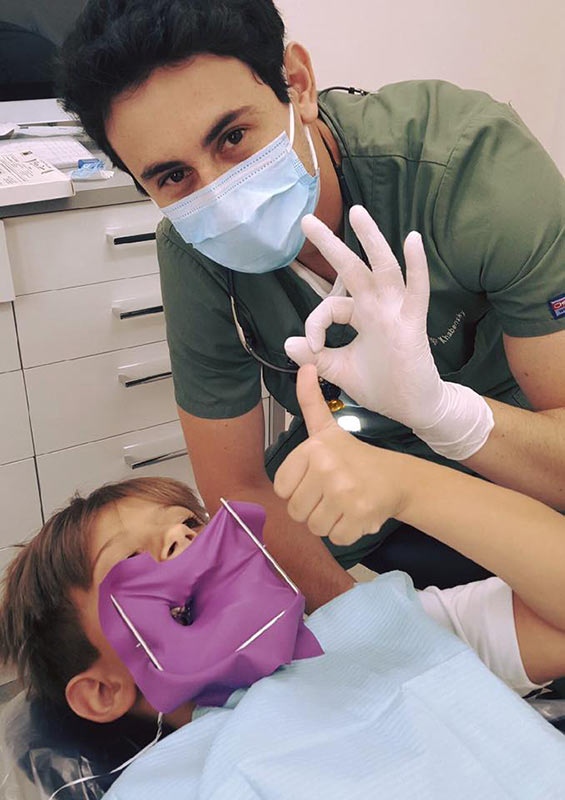Pediatric Dentist Near Me: Find the most effective Oral Take Care Of Your Kid
Pediatric Dentist Near Me: Find the most effective Oral Take Care Of Your Kid
Blog Article
A Comprehensive Guide to Pediatric Dental Treatment and Its Function in Avoiding Common Oral Problems
Understanding pediatric dental treatment is necessary for developing a foundation of lifelong oral health in kids. Early dental sees, appropriate dental hygiene techniques, and dietary understanding are important elements that can significantly mitigate the risk of usual dental issues such as cavities and malocclusion. By gearing up both caretakers and children with the required expertise and skills, we can foster healthy practices that promote anxiety-free oral experiences. Yet, the inquiry continues to be: just how can these strategies be successfully implemented to make sure lasting results?
Significance of Very Early Oral Brows Through
Recognizing the significance of early oral brows through can set the foundation for a youngster's long-lasting oral health and wellness. Developing a partnership with a pediatric dentist as early as the eruption of the first tooth, generally around 6 months old, is important. These initial gos to not only familiarize kids with the dental atmosphere however also enable for early detection of possible concerns, such as misalignment or dental caries.
Early oral examinations empower caretakers with valuable understanding regarding correct oral care, nutritional referrals, and the avoidance of oral illness. Pediatric dental practitioners are skilled in resolving the special demands of kids, making sure that they receive age-appropriate education on dental health. Furthermore, these check outs offer an opportunity to discuss behaviors such as thumb-sucking and pacifier usage, which can impact oral advancement.
Vital Oral Health Practices
Establishing a strong foundation for a youngster's oral health surpasses normal dental sees; it likewise entails instilling efficient dental health methods from an early age. Caregivers and parents play a critical function in teaching children correct techniques to keep their dental wellness.

Flossing ought to begin when two teeth touch, as this protects against plaque accumulation in hard-to-reach areas. Parents ought to aid their kids with brushing and flossing up until they are about 7 or 8 years of ages to make sure thoroughness.
Additionally, developing normal oral check-ups every 6 months enables expert surveillance of oral health and wellness. Teaching children the importance of dental hygiene and making it an enjoyable, engaging activity can cultivate lifelong healthy and balanced behaviors that are essential in protecting against typical dental problems.

Role of Nutrition in Dental Health
Nourishment plays a critical duty in preserving optimum dental wellness, as the foods children consume can significantly impact the growth and strength of their teeth. A healthy diet abundant in essential nutrients is essential for constructing strong enamel and sustaining overall oral wellness (kid dentist near me). Key nutrients, such as calcium, vitamin, and phosphorus D, are essential for the formation of healthy teeth and bones. Foods like milk products, leafy greens, and strengthened cereals can boost calcium and phosphorus levels, while direct exposure to sunlight or nutritional sources of vitamin D can improve calcium absorption.
Conversely, a diet plan high in acids and sugars can bring about damaging effects on dental wellness. Sugary treats and beverages can promote the development of unsafe bacteria in the mouth, resulting in boosted level of acidity and a greater threat of dental cavity. It is vital for caretakers to urge healthier snack alternatives, such as fruits, veggies, and entire grains, which not just offer needed nutrients however likewise promote saliva production, additional shielding teeth.
Common Oral Issues in Children
Dental health issues are a common concern for several moms and dads, as youngsters can experience a range of issues that might impact their dental wellness. One prevalent issue is tooth decays, or tooth cavities, which develop from the demineralization of tooth enamel because of acid-producing germs. This condition is often exacerbated by bad nutritional behaviors, such as constant intake of sweet treats and beverages.
Another common trouble is malocclusion, where teeth are misaligned, leading to problems in biting, eating, and speaking. Furthermore, gingivitis, a very early type of gum disease, can take place in children, usually due dental center to poor dental hygiene methods.
Tooth injuries, including fractures or avulsions, are also frequent amongst active kids. These can result from drops, sports, or mishaps. Early identification and treatment are essential in taking care of these issues to avoid additional complications. Normal dental examinations play an essential function in detecting and resolving these typical oral issues successfully.
Building Lifelong Dental Practices
Instilling excellent oral hygiene methods early in life establishes the structure for a lifetime of healthy teeth and gums. Developing a regular regimen for cleaning and flossing is vital; children ought see here to clean their teeth two times a day with fluoride tooth paste and start flossing as quickly as 2 surrounding teeth touch. Parents play an essential function in modeling these habits, as kids usually copy adult methods.
Informing youngsters about the relevance of oral treatment can even more enhance these routines. Usage appealing methods, such as tales or interactive games, to help them comprehend why normal oral check outs and appropriate hygiene are vital. Additionally, presenting a balanced diet reduced in sugar can substantially minimize the risk of tooth cavities and promote oral health.
Routine dental examinations, usually recommended every 6 months, offer a possibility for expert assistance and very early discovery of prospective problems. These visits can additionally help children develop a favorable association with oral care. By cultivating these practices and perspectives from a young age, parents can equip their children to take obligation for their dental health, inevitably resulting in a life time of confident smiles and reduced oral problems.
Final Thought

Early oral check outs, correct oral hygiene techniques, and dietary awareness are useful link essential components that can substantially reduce the threat of common dental issues such as dental caries and malocclusion.Early dental examinations encourage caregivers with beneficial expertise regarding correct oral care, nutritional suggestions, and the avoidance of dental diseases. Routine oral exams play a vital role in finding and addressing these common dental problems successfully.
Early oral visits, along with the implementation of efficient oral health methods and correct nourishment, dramatically contribute to the prevention of common dental problems such as cavities and gingivitis. By instilling positive dental habits from an early age, children are much more likely to experience healthy teeth and gum tissues throughout their lives, eventually fostering a culture of oral health that can be sustained into adulthood.
Report this page